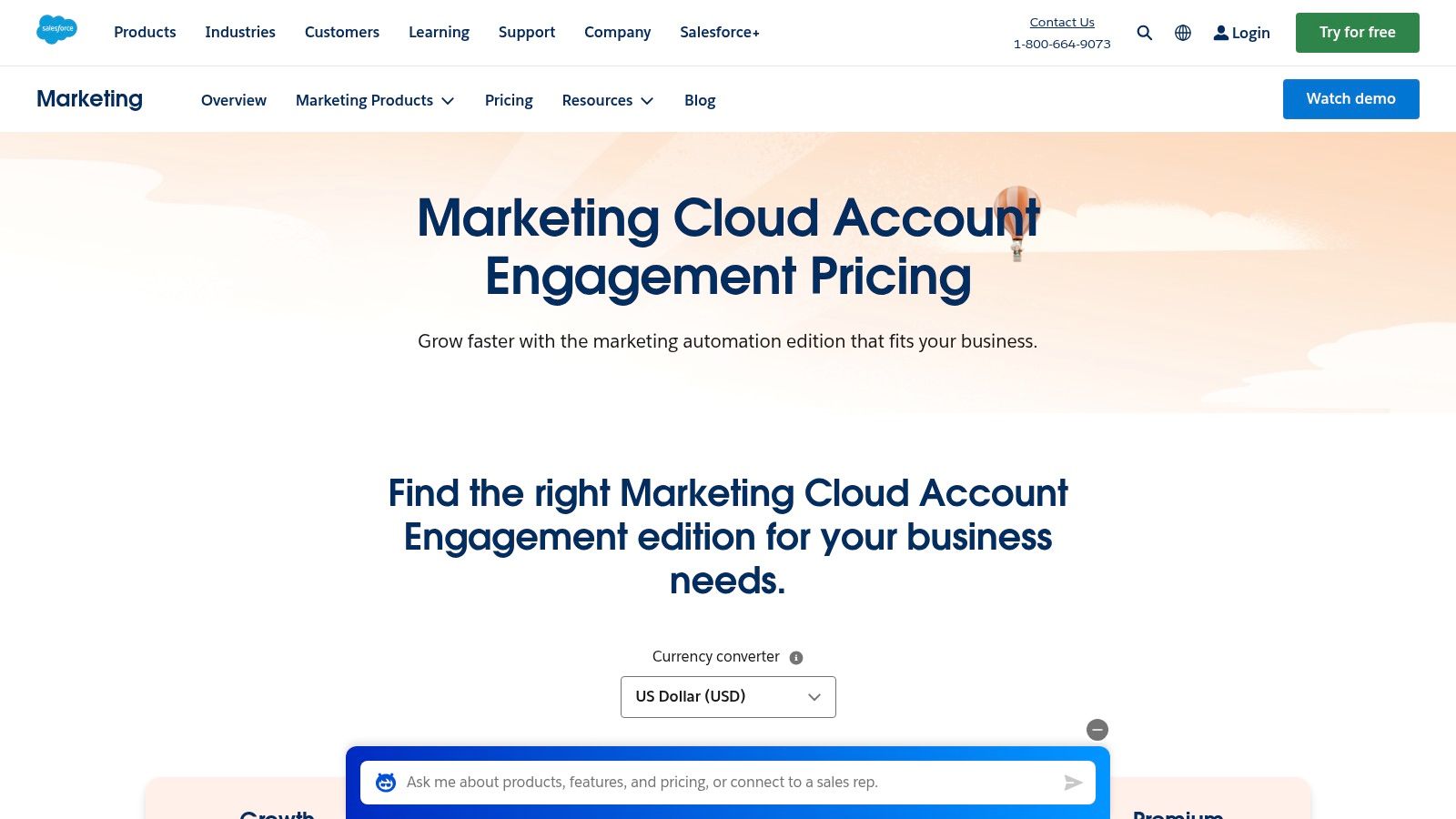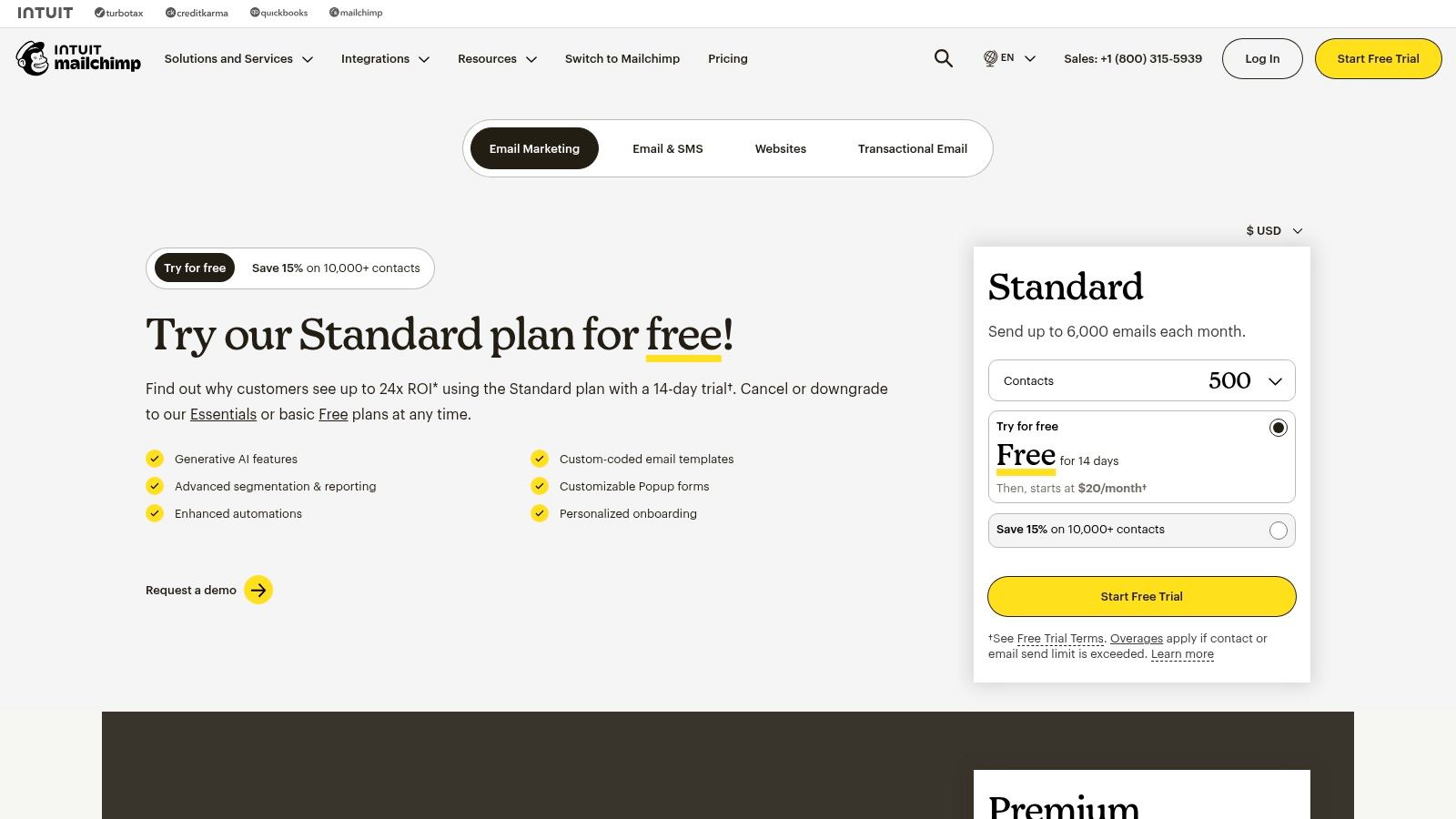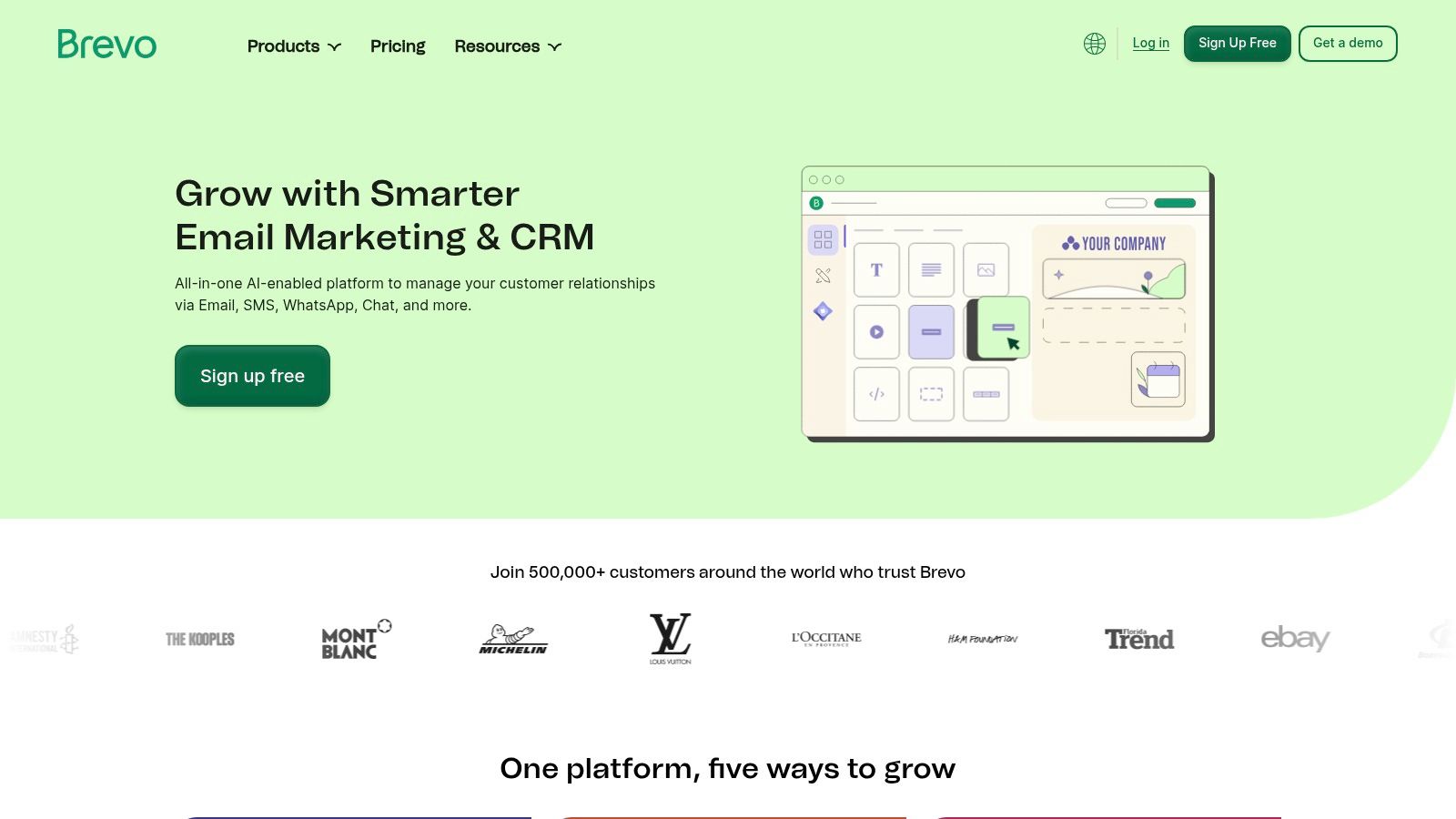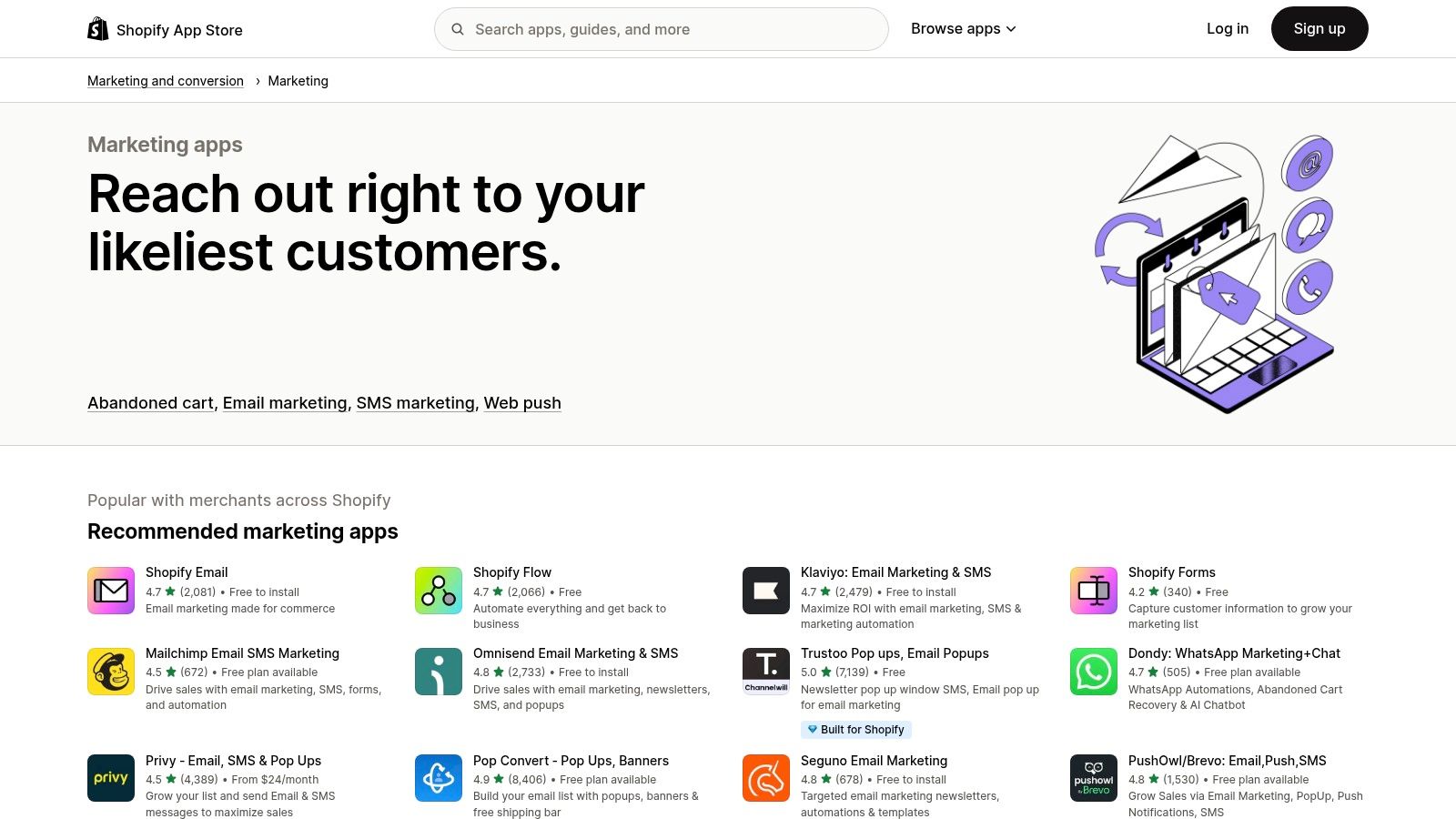Marketing today requires more than just scheduling posts or sending emails. To truly connect with customers, you need to be smart, predictive, and personal—all at a massive scale. This is where AI marketing automation tools come in. They do more than basic tasks. These advanced platforms use artificial intelligence to understand what customers might do next, optimize your ad spending, personalize content on the fly, and find your best leads with impressive accuracy.
By using AI, marketing teams can hand off complex, repetitive work to software. This frees up marketers to focus on big-picture strategy and creative ideas. The result is a more efficient marketing process that’s driven by data, leading to better conversion rates and a higher return on your investment. For example, in higher education, automation helps guide students through the complex enrollment process. You can see how this works in marketing automation in higher education.
This guide gets straight to the point. We've rounded up the best AI marketing automation tools available today. For each one, we’ll give you the key details you need to make a smart decision:
- Key AI features and what marketing problems they solve.
- How they are used by e-commerce, B2B, and large companies.
- An honest look at the pros and cons from real users.
- Clear pricing information to help you budget.
- Screenshots and links to check out each tool for yourself.
Our goal is to help you find the right tool to improve your marketing, whether you’re a small startup needing an all-in-one platform or a large company looking for advanced features. Let's dive into the tools that will shape marketing success in 2025.
1. HubSpot Marketing Hub
HubSpot Marketing Hub is a top choice because it builds powerful AI marketing automation tools right into its famous CRM platform. This all-in-one approach is perfect for businesses of all sizes that want a single system to manage the entire customer journey. Instead of just adding AI features, HubSpot uses them to improve its core tools for lead nurturing, content creation, and analytics.
One of HubSpot's biggest strengths is its visual workflow builder, which lets you easily map out complex automation for emails, ads, and lead scoring. AI features like send-time optimization and predictive lead scoring look at your past data to reach people at the best possible time. For content, the AI Content Assistant helps write blog posts, emails, and social media updates, which makes creating campaigns much faster. This is a key part of building a solid AI marketing strategy for your business.
Key Features & Considerations
HubSpot is loved for its easy-to-use design and huge support community, but it's important to understand the pricing. The cost is based on how many marketing contacts you have, which can get expensive as you grow. Also, some of the most advanced features, like detailed revenue attribution, are only available in the top-tier Enterprise plan.
2. Salesforce Marketing Cloud Account Engagement (Pardot)
Salesforce's B2B marketing automation tool, which used to be called Pardot, is built for businesses that already use the Salesforce CRM. It’s designed to bring marketing and sales teams closer together by using the same customer data. Its main strength is using Einstein AI to provide smart predictions on top of all that rich customer information. This makes it a great choice for companies with long B2B sales cycles and account-based marketing strategies.

The platform’s deep connection with Salesforce CRM allows for advanced lead nurturing and scoring that sales teams can act on right away. Einstein AI makes this even better with features like Behavior Scoring, which spots which prospects are ready to talk to sales based on their online activity. This makes it one of the most powerful ai marketing automation tools for large companies focused on turning leads into revenue and proving marketing’s value with detailed reports.
Key Features & Considerations
While the strong CRM integration helps align sales and marketing perfectly, new users might find it has a steeper learning curve than simpler platforms. You also have to commit to an annual contract, and the price goes up as you add more contacts, which can be a big investment. The platform really shines when a business is ready to use its high-level analytics and control features.
3. Adobe Marketo Engage
Adobe Marketo Engage is a high-level marketing automation solution made for complex marketing needs. It’s part of the Adobe Experience Cloud and is especially good for B2B companies and businesses that sell high-value products. The platform goes beyond basic automation, using AI to manage detailed customer journeys, personalize content for large audiences, and run precise account-based marketing (ABM) campaigns.
Marketo’s main strength is how flexible and powerful it is, letting marketers handle everything from finding new leads to proving how marketing drives revenue. AI features like Predictive Audiences help you automatically find and target the best customer groups, while its AI-powered content tools personalize messages across different channels to get the best results. This makes it a top choice for big companies that need a lot of control and deep connections with CRMs like Salesforce and Microsoft Dynamics.
Key Features & Considerations
While Marketo is incredibly powerful, its complexity and focus on large enterprises mean it takes longer to learn and costs more. The pricing is customized for each organization, which makes it less suitable for small to medium-sized businesses. However, for companies that can take full advantage of its features, the return on investment from its advanced customer journeys and reporting is huge.
4. Intuit Mailchimp (Marketing Platform)
Intuit Mailchimp has long been the starting point for small businesses getting into email marketing, and now it uses AI to make its simple platform even smarter. It stands out by building AI marketing automation tools directly into its main email and campaign features, which makes tasks like creating content and engaging with audiences much easier. This makes it a great choice for small to medium-sized businesses and e-commerce stores that need powerful, easy-to-use tools without the complexity of enterprise systems.

The platform mainly uses AI to help with optimization and content. Features like the Subject Line Helper suggest catchy titles based on what works best in your industry, while send-time optimization figures out the best time to send messages so they’re more likely to be opened. For businesses new to automation, Mailchimp offers pre-built customer journey templates that are easy to customize, which helps you get started quickly. This focus on useful AI features makes it one of the most important marketing tools for growing businesses.
Key Features & Considerations
Mailchimp is famous for its simple design, large template library, and a free plan that makes it easy to start. However, as your business grows, the cost can go up quite a bit based on your number of contacts and how many emails you send. While its automation is great for simple customer journeys, it’s not as well-suited for the very complex, multi-channel campaigns that more advanced platforms can handle.
5. ActiveCampaign
ActiveCampaign calls itself a customer experience automation platform, mixing powerful email marketing and CRM tools with easy-to-use AI. It's a great fit for small to mid-sized businesses that want advanced automation without the high price of an enterprise system. The platform is especially good at creating very personalized customer journeys by using AI to engage with people at just the right time.
The heart of ActiveCampaign is its visual automation builder, which lets marketers map out detailed, multi-channel campaigns that include email, SMS, and website messages. AI makes these campaigns even better with features like Predictive Sending, which analyzes when each person usually opens emails and sends messages at that perfect time. This focus on individual-level personalization makes it one of the most effective ai marketing automation tools for nurturing leads and keeping customers happy with relevant communication.
Key Features & Considerations
ActiveCampaign is praised for its powerful automation features at a good price, with clear, contact-based pricing and a free 14-day trial. However, the large number of features, add-ons, and different plans can be a bit confusing for new users trying to figure out which package they need. To get the most out of it, you’ll need to invest some time in learning the platform.
6. Klaviyo (Email, SMS, CDP for Ecommerce)
Klaviyo has become the top AI marketing automation platform for e-commerce businesses, especially those using Shopify, BigCommerce, and Magento. Its strength comes from connecting deeply with online stores to gather rich customer data, which it then uses to run highly personalized and predictive marketing campaigns. Instead of just sending generic emails, Klaviyo focuses on actions that make money, using AI to predict things like which customers might leave, their lifetime value, and the best times to send messages.
The platform brings email and SMS marketing together, so merchants can create seamless, multi-channel customer journeys. Its tool for grouping customers is very powerful, letting marketers build audiences based on browsing history, how often they buy, and AI-powered predictions. This makes it one of the most effective top AI-powered marketing tools for keeping customers coming back and increasing how much they spend. Klaviyo’s pre-built automation for abandoned carts, welcome emails, and winning back old customers are designed to start generating sales right away.
Key Features & Considerations
While Klaviyo is amazing for e-commerce, businesses should know that its pricing is based on the number of active email and SMS contacts, which can grow quickly. Advanced features, like its Customer Data Platform (CDP) for combining data from different sources, are sold as a separate add-on. However, its smooth Shopify integration and revenue-focused AI features make it a must-have tool for online stores that want to grow fast.
7. Brevo (formerly Sendinblue)
Brevo stands out by offering a powerful, multi-channel marketing platform at a very affordable price, making it a great choice for startups and small businesses. It goes beyond just email by including SMS, WhatsApp, and web push notifications in its automation campaigns. Brevo’s approach to AI marketing automation tools is practical and simple, focusing on key improvements that provide immediate results, rather than confusing users with too many complex features.

The platform’s main AI feature is its send-time optimization, which analyzes when each person usually engages with messages and delivers them at that perfect time. This simple but powerful tool can really improve your campaign results. Brevo’s strength is its pricing model, which is based on the number of emails you send, not the number of contacts you have. This lets you have unlimited contacts and only pay for what you send, which is a big difference from many competitors. This makes it easy and affordable to scale your marketing.
Key Features & Considerations
Brevo is praised for its generous free plan and easy-to-use design, but you should know that some advanced features, like a dedicated IP address or more detailed A/B testing, are only available on higher-priced plans or as paid add-ons. The platform is an excellent all-in-one solution for businesses that want to focus on direct communication channels without the high cost of an enterprise tool.
8. Iterable
Iterable is a top-tier cross-channel customer engagement platform built for brands that need advanced, AI-powered personalization on a large scale. Its strength is in bringing all customer data together to run highly individual marketing campaigns across email, mobile push notifications, SMS, and in-app messages. Unlike general marketing platforms, Iterable’s AI tools are specifically designed to predict customer behavior and automate decisions that build brand loyalty and increase revenue.
The platform's AI suite includes powerful tools like Brand Affinity™, which figures out what each customer likes, and Predictive Goals, which forecasts if a user is likely to complete an important action. This lets marketers go beyond simple customer groups and create dynamic journeys that change in real-time. Iterable is one of the more advanced ai marketing automation tools for teams focused on getting the most value out of each customer through deeply personalized, multi-channel communication.
Key Features & Considerations
Iterable’s powerful features are built to scale, making it a popular choice for fast-growing B2C companies. However, this power comes with a learning curve and a price tag aimed at the enterprise market. New users should expect a dedicated setup process to get the most out of the platform's many features. The custom pricing means it’s not as accessible for smaller businesses or those with limited tech resources.
9. G2: Marketing Automation Software Category
While it’s not a tool itself, G2’s Marketing Automation Software category is a must-use resource for anyone looking at AI marketing automation tools. It’s a huge marketplace that gathers reviews, feature comparisons, and real feedback from actual users. This platform helps marketers see past the sales pitches and understand how these tools really work in the real world.
G2’s biggest strength is its powerful filtering and comparison tool. You can sort the long list of tools by company size, user ratings, specific features like AI, and pricing. This makes it a great first step for creating a shortlist of tools that fit your business needs. By reading the detailed pros and cons from verified users, teams can spot potential problems early on, saving a lot of time and money.
Key Features & Considerations
G2 offers a clear, data-driven way to choose software. However, it's important to remember that reviews can sometimes be biased toward users who are either very happy or very unhappy. The best way to use G2 is to create a list of top options and then try them out with free trials or demos to make sure the platform is the right fit for your specific needs.
10. Capterra: Marketing Automation Software Directory
While it’s not an AI tool itself, Capterra's Marketing Automation Software Directory is a vital resource for finding and comparing the best AI marketing automation tools out there. It serves as a great starting point for businesses trying to sort through the crowded software market. The platform lets you filter hundreds of options by specific features, pricing models, company size, and user ratings, which makes the research process much faster.
Capterra's value comes from its organized comparison tools and user reviews. Instead of going to dozens of different websites, you can create a shortlist and see side-by-side comparisons of key features. This is especially helpful for finding out which AI-powered features, like predictive analytics or content creation, are offered by different platforms. The directory also has helpful buyer's guides and articles that teach you what to look for in a modern marketing automation tool.
Key Features & Considerations
Capterra is an excellent resource for your initial research and for creating a shortlist of potential tools. However, since it gathers data from many sources, it's a good idea to double-check details on the official vendor websites, as pricing and features can change. The platform’s real strength is helping you quickly narrow down the field from hundreds of options to just a few that fit your specific business needs.
11. Shopify App Store: Marketing Automation Apps
For e-commerce businesses on Shopify, the platform's own App Store is the best place to find powerful and well-integrated AI marketing automation tools. Instead of offering one single solution, Shopify has a collection of specialized apps that are designed to work perfectly with its customer and order data. This allows store owners to build a custom marketing toolkit that fits their exact needs, from recovering abandoned carts to personalizing customer emails.

The biggest benefit of using apps from this marketplace is that they are easy to set up. Apps can instantly access important Shopify data like purchase history and browsing behavior to power their AI-driven automation. This makes it easy to launch advanced campaigns, like AI-powered product recommendations in emails or smart SMS follow-ups triggered by certain customer actions. The store's clear review and rating system also helps store owners choose reliable and effective tools.
Key Features & Considerations
While the Shopify App Store is incredibly convenient and offers a wide range of choices for its users, it is almost exclusively for businesses using Shopify. If you don't use Shopify, these tools won't work for you. Many apps have a free plan or offer free trials, but the costs can add up as you add more specialized tools to your marketing setup.
Top AI Marketing Automation Tools Comparison
Making the Right Choice for Your Automated Future
Choosing from all the AI marketing automation tools out there can feel like a big task, but it's a key step toward building a smarter, more efficient marketing system. As we've seen, there is no single "best" tool for everyone. The right one is the tool that fits your specific business, your current technology, your team's size, and your main goals.
Switching from manual work to smart automation is a game-changer. It lets your team stop doing repetitive tasks like sorting audiences, A/B testing, and sending follow-up emails. Instead, they can focus on what matters most: creative strategy, building your brand, and solving complex problems. All the platforms we’ve covered, from big enterprise tools like Adobe Marketo Engage to e-commerce experts like Klaviyo, have the same goal: to turn your data into smart actions and your plans into real results.
Key Takeaways and Strategic Synthesis
To make things simple, here’s what you should think about. Your choice depends on your biggest need. Are you a B2B company that relies heavily on a CRM? A tool with deep integration like Salesforce Marketing Cloud Account Engagement (Pardot) or HubSpot’s Marketing Hub will give you the smoothest data flow and help align your sales and marketing teams.
On the other hand, if you run an e-commerce business, you should look for tools that are great at personalizing experiences and communicating across multiple channels (like email and SMS). Klaviyo and ActiveCampaign are excellent here because they can group customers based on what they’ve bought or looked at. For startups and small businesses, platforms like Brevo and Mailchimp are a great way to get started with a strong set of features that can grow with you.
Actionable Next Steps: A Roadmap to Implementation
Choosing the right tool is just the beginning. The real value comes from using it well. Here’s a simple plan to help you get started:
- Define Your Top 3-5 Problems: Before you look at prices, write down the main marketing challenges you want to solve with automation. Is it lead scoring, abandoned carts, personalized content, or ad optimization?
- Create a Shortlist: Based on our reviews, pick two or three platforms that seem like the best fit for your problems and budget.
- Try Demos and Free Trials: This is a must-do step. Use free trials to see how the tool feels, connect it to your data if you can, and build a test campaign. This hands-on experience will tell you more than any feature list.
- Check How It Connects: See how easily a new tool will work with your current systems, like your CRM, e-commerce platform (like Shopify), or analytics software. Bad connections can create problems and ruin the benefits of automation.
- Plan for Training: Think about the learning curve for your team. A powerful tool is useless if no one knows how to use it. Ask about the quality of the support and training they offer.
In addition to these major platforms, you can also find a wide range of specialized social media tools for specific tasks. These can work alongside your main marketing automation tool to handle very specific channel needs. The goal is to build a set of tools where each one has a clear and valuable purpose.
Ultimately, using AI marketing automation tools successfully is about more than just technology—it’s a change in strategy. It’s about creating a culture that relies on data to make decisions and is always looking for ways to improve. The right platform won't just automate your tasks; it will boost your team's creativity and help you grow for years to come.
Frequently Asked Questions (FAQ)
What are AI marketing automation tools?
AI marketing automation tools are software platforms that use artificial intelligence (AI) and machine learning to automate marketing tasks. Unlike traditional automation tools that follow simple "if-then" rules, AI-powered tools can analyze data, predict customer behavior, personalize content in real-time, and optimize campaigns on their own to improve results.
How does AI improve marketing automation?
AI improves marketing automation in several key ways:
- Predictive Analytics: AI can predict which leads are most likely to convert or which customers might churn.
- Hyper-Personalization: It analyzes user data to deliver highly relevant content, product recommendations, and offers to each individual.
- Optimization: AI automatically A/B tests campaigns, optimizes ad spend across channels, and determines the best time to send emails.
- Efficiency: It automates complex tasks like audience segmentation and data analysis, freeing up marketers to focus on strategy.
What is the best AI marketing automation tool for a small business?
For small businesses, the best tools are often those that are affordable, user-friendly, and offer an all-in-one solution. Platforms like Brevo (formerly Sendinblue) and Intuit Mailchimp are excellent starting points. They provide generous free or low-cost plans, easy-to-use automation builders, and core AI features like send-time optimization.
Which tool is best for e-commerce?
Klaviyo is widely considered the top choice for e-commerce businesses, especially those on Shopify. It integrates deeply with e-commerce platforms to use purchase and browsing data for highly personalized email and SMS campaigns. Alternatives like Markopolo, Omnisend, ActiveCampaign, and Drip offer multi-channel automation, AI-driven targeting, and cross-platform campaigns for brands looking to grow beyond just email marketing.
Can AI tools help with my ad campaigns?
Yes, absolutely. Tools like Markopolo are specifically designed to use AI for ad campaigns. Its Nucleus AI agent automatically allocates your budget to the best-performing ads on platforms like Meta, Google, and TikTok. This maximizes your return on investment (ROI) and reduces the manual work of constantly monitoring and adjusting campaigns.
Ready to unify your marketing efforts and unlock the power of AI? Markopolo offers a comprehensive cross-channel advertising automation platform that simplifies everything from content creation to ad optimization and performance analytics. See how our AI-powered solution can streamline your campaigns and deliver superior results by visiting Markopolo to get started.








.png)
.jpg)



